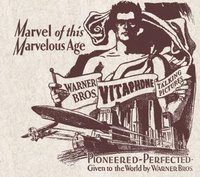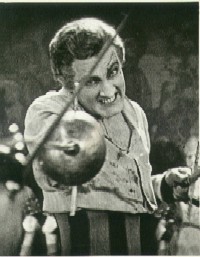 Don Juan (1926)
Don Juan (1926)Director: Alan Crosland
This year will see several champagne corks fly to celebrate the 80th anniversary of the introduction of Vitaphone to the American moviegoing public. On July 26, the Academy of Motion Picture Arts and Sciences (AMPAS) plans to present the Vitaphone Corporation’s complete sound-on-disk program at the Linwood Dunn Theatre in Hollywood just as it occurred in 1926 at the Warner Theater in New York City.
Warner Brothers' premiere of the Vitaphone process, for which Don Juan was the centerpiece, made a small noise compared with the thunderous response when it released The Jazz Singer (also directed by Crosland) in 1927, allowing millions to hear vaudeville's  megastar Al Jolson sing out from the flat screen. Nonetheless, the use of a record synchronized to actions on the movie screen got a very respectable launch with the John Barrymore vehicle Don Juan and several short subjects. Subscribers to Turner Classic Movies got a sneak preview this weekend when TCM presented the first program AMPAS will offer later this month.
megastar Al Jolson sing out from the flat screen. Nonetheless, the use of a record synchronized to actions on the movie screen got a very respectable launch with the John Barrymore vehicle Don Juan and several short subjects. Subscribers to Turner Classic Movies got a sneak preview this weekend when TCM presented the first program AMPAS will offer later this month.
This tale of the legendary ladies' man begins in his childhood. A five-year-old Don Juan plays happily with his father Don Jose (John Barrymore) and mother Donna Isobel (Jane Winton) in their castle in Seville, Spain, before Don Jose must leave on a trip. After he rides away, Donna Isobel waves her lover in from the garden. Unfortunately, the trip was a ruse designed to capture Donna Isobel in flagrante. The lover hides in an opening in the thick castle walls, and Donna Isobel plays dumb as her husband calls some men in to finish repairing the wall. Donna Isobel's anxiety grows until the last stone is replaced, sealing her lover alive in the wall. She flings herself at the wall and pleads with Don Jose to spare him. Instead, in a heartbroken rage, he sends her away as little Don Juan cries out for her.
Don Jose goes on to live a life of debauchery, never keeping company with a woman for more than a couple of months. He is teaching his growing boy (a radiant Freddie Bartholomew look-alike named Philippe de Lacy) never to give his heart to any woman. During a banquet, Don Jose spurns the attentions of his current paramour Donna Elvira (Helena D'Algy) for a new love. In a jealous rage, she stabs him through the heart. In his dying breath, he muses to Don Juan that the circle of woman is finally complete, "birth, disillusionment, death."
The movie fast-forwards to Rome, where the grown Don Juan (Barrymore) has taken up residence and built a reputation as a womanizer. He attracts the attention of the reigning Borgia  family, particularly Lucrezia (Estelle Taylor), who believes her enormous political power and, of course, irresistible looks and grace, will see her triumph over the Don where all other women have failed. She invites him to a soiree to which the rival Orsini family members Duke Della Varnese (Josef Swickard) and his daughter Adriana (Mary Astor) have been invited on behalf of a smitten friend of the Borgias, Count Giano Donati (Montagu Love). Don Juan, like Donati, is drawn to Adriana's virtue, and he makes an enemy of the Borgias by rejecting Lucrezia to pursue Adriana. Love has its trials, of course, including a massive sword fight and imprisonment for the Don and torture for Adriana. But Hollywood being what it is, true love triumphs over power and a bad upbringing.
family, particularly Lucrezia (Estelle Taylor), who believes her enormous political power and, of course, irresistible looks and grace, will see her triumph over the Don where all other women have failed. She invites him to a soiree to which the rival Orsini family members Duke Della Varnese (Josef Swickard) and his daughter Adriana (Mary Astor) have been invited on behalf of a smitten friend of the Borgias, Count Giano Donati (Montagu Love). Don Juan, like Donati, is drawn to Adriana's virtue, and he makes an enemy of the Borgias by rejecting Lucrezia to pursue Adriana. Love has its trials, of course, including a massive sword fight and imprisonment for the Don and torture for Adriana. But Hollywood being what it is, true love triumphs over power and a bad upbringing.
Aside from an overwrought third act and Hollywood ending, this film has a great deal to recommend it. Alan Crosland directs his cast with a deft hand, muting even the most florid scenes by keeping their emotions real and their gesticulations to a minimum. Barrymore is especially good as Don Jose--his fury at his betrayal terrifying to watch even through the distance of time and celluloid. I've seen a number of films in which people are buried alive, but this film's is the most horrifying in my experience, with effective crosscutting between the terrified Donna Isobel, murderous Don Jose, smirking manservant Leandro (John Roche), and efficient servants doing their deadly work.
The Roman home of Don Juan is a setting for a great short comedy within the film. Pedrillo (Willard Louis) is a jovial co-conspirator in Don Juan's amorous shenanigans. He keeps two ladies waiting for the tardy Don by telling each exactly and identically what they want to hear, "You are his only love." A camera lingers on a closed door, the stand-in for the man behind it as he makes love to a third woman. The timing of the actors and editing is perfect so that despite the predictability of the scene, we can't help but be charmed.
Barrymore, at age 44 and the worse for wear from his acute alcoholism, does not cut a particularly alluring figure. He looks haggard, particularly in profile, making him somewhat unconvincing as the supreme lover of women. Yet he attacks his action sequences with relish and energy and projects the superior air of a man who would defy Lucrezia Borgia, known today mainly for her penchant for poisoning her foes. Small delights for the classic movie fan include appearances by the future Charlie Chan, Warner Oland, as Lucrezia's brother Caesar and Myrna Loy as her maidservant Mai.
Despite being a Vitaphone film, Don Juan does not use the process to produce dialogue. Instead, Vitaphone was used to sync a film score perfomed by the New York Philharmonic Orchestra. It is one of the finest scores I've ever heard for a silent movie and well deserving of recognition.
I watched two of the shorts that accompanied the first Vitaphone presentation, one of the New York Philharmonic playing and the other a hilarious "commercial" for the new sound process by none other than an ill-at-ease Will Hays, the author of the infamous Production Code that brought censorship to the movies. These novelties were mere icing on the cake for a terrific debut sound film. Seek them and the other shorts out if you can, but definitely try to get your hands around a copy of Don Juan. This piece of film history is a cracking good film to the core. l


2 Comments:
At 9:11 PM, Anonymous said…
Anonymous said…
I hate to bring history into this but Lucrezia Borgia never poisoned anyone. Her brother Cesare did murder her second husband...
At 8:26 AM, Marilyn said…
Marilyn said…
Nonetheless, that's what people think of when they think of her. The reputation is writ large in the movie. She even has her own apothecary mixing poisons for her to us on Pere Della Varnese in this film.
Post a Comment
<< Home